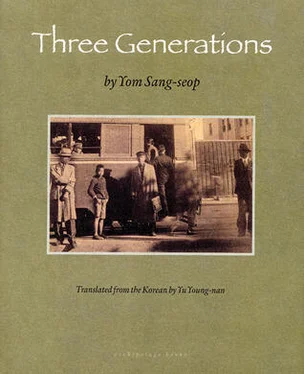A short while later, Pi-hyeok also passed through the back gate. He had left at Byeong-hwa’s urging, after having thrown on the overcoat and a pair of rubber shoes. Swaths of white jacket sleeves peeked out of his Korean overcoat. He had no particular destination in mind. With three hundred won as “pocket change,” he was free to go where he pleased. But he felt that everyone’s eyes were on him, no matter which way he turned.
Holding a parcel larger than the one she had brought, Pil-sun followed Pi-hyeok through the gate. Gyeong-ae and Byeong-hwa had wrapped the remaining two thousand won in a sheet of newspaper, rewrapped it tightly with Pi-hyeok’s Western jacket, and gave it to Pil-sun to take to Bacchus. They asked Gyeong-ae’s mother to hurry over to Hyeonjeo-dong and ask the nanny to stay there for the time being.
The mother didn’t understand exactly what was going on, but she guessed that something must have happened to her visiting nephew. She quickly changed clothes and ventured out as directed but felt uneasy about leaving the two young people behind.
Gyeong-ae and Byeong-hwa were finally able to sit face-to-face. They had staggered everyone’s departure by five or ten minutes and were relieved that the whole operation had gone smoothly. Worrying about one thing after another, their eyes darted frequently to the gate.
Gyeong-ae hadn’t had time to change; she was still wearing her pajamas and overcoat, and she didn’t feel like washing her face. Sitting across from Byeong-hwa, she smoked a cigarette, inhaling deeply. Neither said anything, but both were fraught with anxiety. A thought came to both of them: We should give the same answers if interrogated.
“I hope he makes it across the border. If he’s caught, we’ll be beaten to a pulp,” Gyeong-ae considered calmly.
“We’ll just have to wait and see. We’d better hurry over to Bacchus. Should I leave through the back gate, too?”
“What are you talking about? Use the front gate. That’s our only option, even if it means getting caught.”
He knew she was right. If the police noticed that he’d snuck out the back gate, they’d become more suspicious and would soon be in hot pursuit of Pi-hyeok.
“Do you really think the guy waiting down the alley is an inspector? You’re probably scared of your own fart at this point.”
“A very ladylike way of speaking you have,” Byeong-hwa lamented. “Go and have a look yourself if you’re so curious.”
Gyeong-ae went out, pretending to shut the half-open gate, and caught sight of a Western-suited man leaning against the wall. Hearing the clatter of the gate, he looked her way and their eyes met, but he quickly turned back toward the alley as if he were waiting for someone.
“He’s there! He’s there! What do we do?”
“Now you’re scared!”
“Why should I be scared? What did I do wrong? You’re the one that needs to stay calm.”
Fear was pressing down on them.
A little later, they heard the gate creak open and the sound of footsteps. “Is anyone home?” a voice called out. Gyeong-ae and Byeong-hwa froze, but as quickly as blood had rushed to their heads, it ebbed, and they regained their composure. Somewhere around the middle gate, they heard the clang of a sword. Again, someone called out, “Is anyone home?”
Gyeong-ae went out to the edge of the veranda.
“Household census. Who is Hong Gyeong-ae?” A policeman, holding an open ledger, approached the veranda, his eyes sweeping the entire house.
“I am.”
“And Yi So-sa?”
“She’s my mother.”
“And Jeong-nye?”
“My daughter.”
“Her father is not here?”
“No.”
“Where is he?”
“He’s dead.”
“So you have only three family members?”
“Yes.”
The policeman folded the ledger and looked around once again.
“Whose shoes are those?” He pointed to the shabby pair of shoes on the shoe ledge.
“A guest’s.”
“Open the door, will you?”
Gyeong-ae laughed in his face. “So, you take a look at guests when you take the census?” She flung open the door, revealing Byeong-hwa seated with his hat on. With a sheepish grin, he stood up and came out. The policeman stared at Byeong-hwa and made an excuse. “We’re taking the census because of an epidemic,” he said and then asked if he could open the door to the other room.
“No one’s there. Open it yourself,” Gyeong-ae said.
The policeman opened the window facing the yard and studied the interior carefully. There was only an old-fashioned two-tier cabinet and folded beddings, along with a neat display of personal items belonging to Gyeong-ae’s mother, including a sewing basket, ironing paddles, and a chamber pot.
The policeman strode over to the kitchen and looked in.
“Isn’t your mother home?” he asked.
“She went out to get something in town. So you keep an eye on contagious diseases like the flu in the winter?” She grinned as though they were involved in a delightful game.
“I don’t know. I just do what I’m told. Doesn’t anyone else live with you? A maid or a servant?” the policeman asked, his face finally brightening for some reason.
“No one.”
“You’re enjoying your peace and quiet, eh? Sorry to interrupt you,” teased the policeman, tossing them another knowing smile before leaving.
The officer had been sent from a nearby police station by an inspector who had been pursuing Byeong-hwa. During his usual evening patrol of the area, the inspector had noticed Byeong-hwa passing the police station late the night before. When he saw Byeong-hwa again early that morning, he followed him, wondering if the den of those dubious characters had moved or if Byeong-hwa himself might have moved to his beat. After taking note that there was no official nameplate, only a makshift paper label bearing the name Yi So-sa posted during the previous national census, he had put the house under surveillance. The man at the end of the alley was not, in fact, an inspector. Gyeong-ae was the one, as it were, who had been frightened by her own fart.
Gyeong-ae and Byeong-hwa assumed as much. By the way a uniformed policeman had been sent in, it didn’t look like they were after Pi-hyeok. If they had been, they could have surrounded the house early in the morning and entered while Pi-hyeok was sleeping.
In any event, a sense of danger was upon them. It was lucky for them that the police imagined the two to be lovers, though it meant that Gyeong-ae might have been placed on the watch list. At any time an inspector could burst upon them, and though they didn’t talk about it, they were both on pins and needles.
They agreed that Byeong-hwa should leave the house first. Promising to meet Gyeong-ae later at Bacchus, Byeong-hwa went to meet Pil-sun, taking detours and choosing as many secluded paths as possible to determine whether he was being followed.
No one appeared to be trailing him. Still nervous, he looked around one last time before entering the bar.
Pil-sun, sitting in the dark, was clearly glad to see him. Her face was still flushed after her long walk in the biting cold.
“You’ve been waiting a long time.”
“Did anything happen?”
“No. A uniformed bastard came, but it’s all right. You can go home now. No,wait a minute.” He took off his jacket, rolled it up, and wrapped it in the cloth that had held Pi-hyeok’s clothes.
“On your way home, make a little detour to Jongno and find a tailor there and ask him to mend the tear. Even if it sounds rather expensive, leave it there. And get a receipt. If anyone’s waiting at home and asks you where you’ve been, tell them you came back from the factory because your stomach hurt or something like that.” Byeong-hwa opened the back door.
Читать дальше












